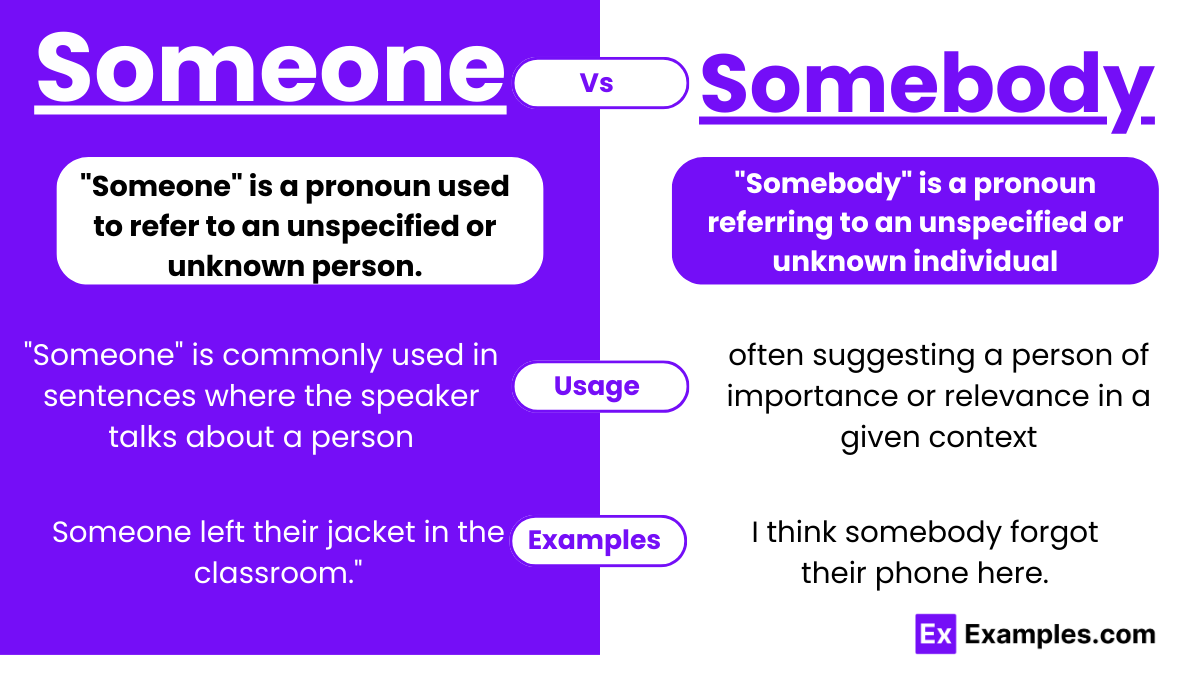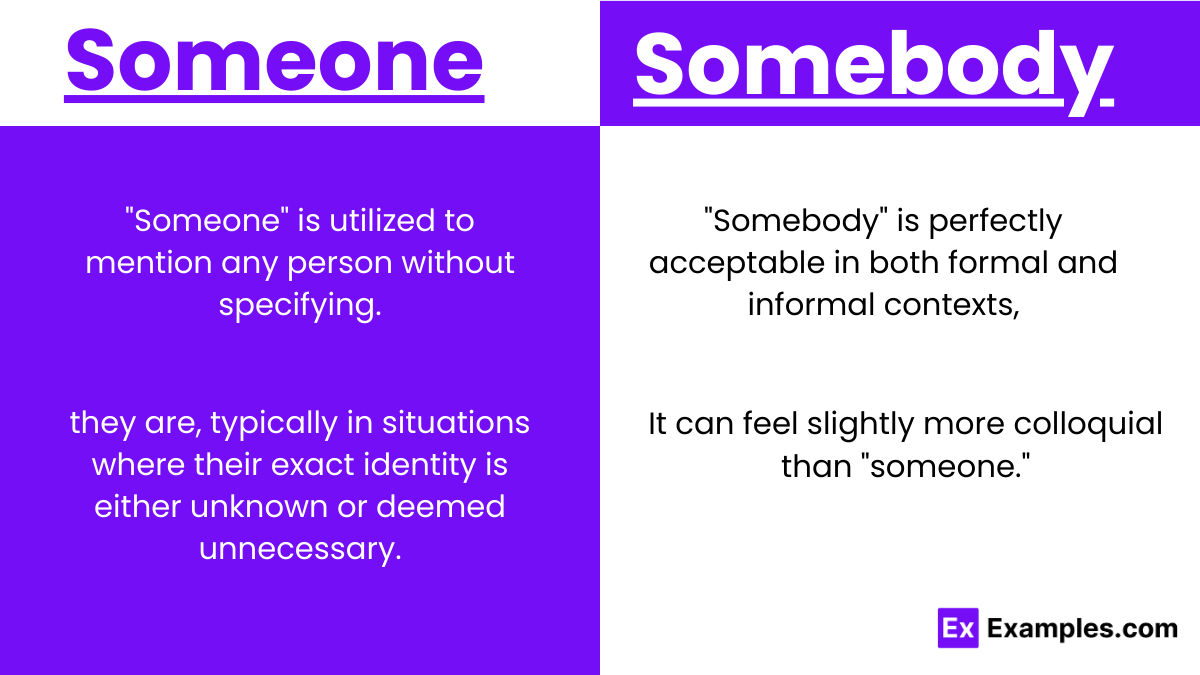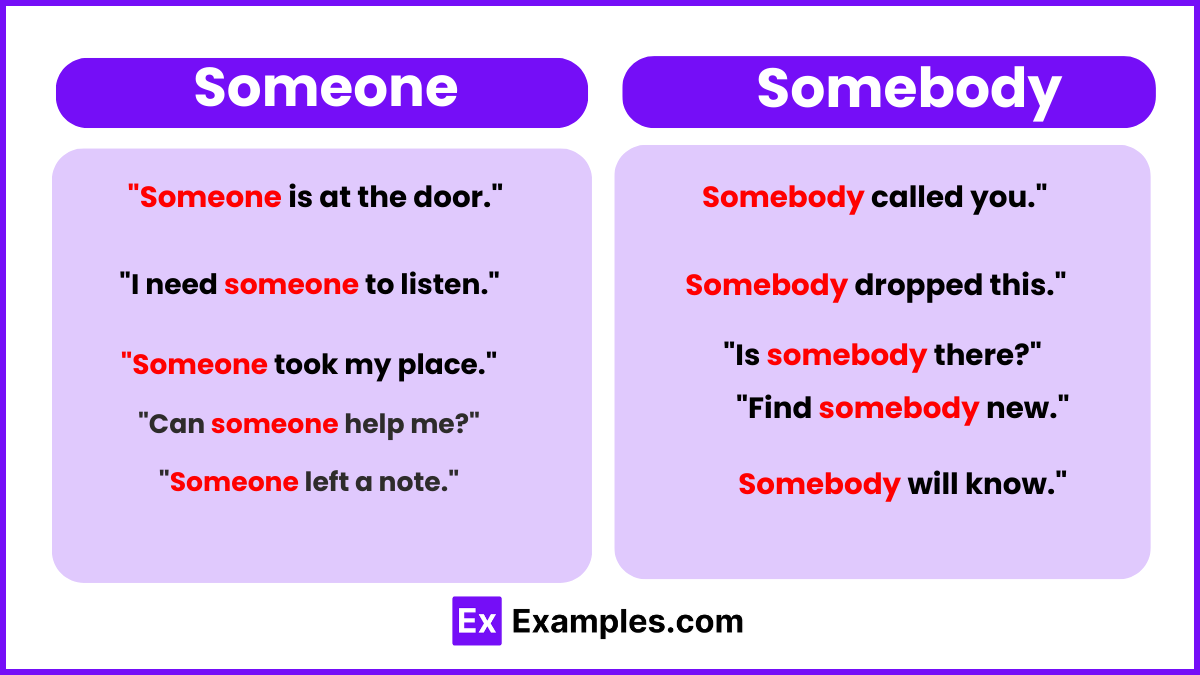Someone vs Somebody – Examples, Difference, Usages, How to use
“Someone” and “somebody” are both indefinite pronouns used to refer to an unspecified person. While they are often used interchangeably, there are slight nuances in their usage. “Someone” is slightly more formal and is commonly used in formal writing or speech. On the other hand, “somebody” is more conversational and casual. Both words serve the same purpose: to refer to an unspecified person in a sentence.
Someone and Somebody – Meaning
- Someone refers to an unspecified person. It is used when the person’s identity is unknown or irrelevant to the context. This pronoun is commonly employed in sentences where the speaker is talking about a person without specifying who they are. It’s versatile and can be used in both formal and informal contexts.
- Somebody
- Somebody shares the same definition as “someone,” meaning an unspecified or unknown person. Like “someone,” “somebody” is used when the identity of the person is not known or is not important. The choice between “someone” and “somebody” often comes down to personal preference or regional differences, with no significant difference in meaning or usage.
Summary
Both “someone” and “somebody” are pronouns used to refer to an unspecified person when the individual’s identity is either unknown or deemed irrelevant. The choice between these two words largely depends on the speaker’s preference, as they are interchangeable in most contexts. Neither term is more formal than the other, and both can be used in a variety of settings, from casual conversations to more formal writing.
How to Pronounce Someone
- Phonetic Spelling: /ˈsʌm.wʌn/
- Pronunciation: The word “someone” is pronounced with two syllables. Start with the sound /sʌm/, where the initial “s” sounds like the “s” in “see,” and the “um” sounds similar to the “u” in “sun.” The second syllable, /wʌn/ rhymes with “won” or “fun.” The emphasis is placed on the first syllable, making it “Some-one.”
How to Pronounce Somebody
- Phonetic Spelling: /ˈsʌm.bɒ.di/
- Pronunciation: “Somebody” also consists of three syllables. The first syllable is pronounced /sʌm/, identical to the first syllable in “someone.” The second syllable, /bɒ/, sounds like the “bo” in “bottle.” The final syllable, /di/, is pronounced like “dee” in “deep.” The stress is on the first syllable, resulting in “Some-body.”
Difference Between Someone and Somebody
| Aspect | Someone | Somebody |
|---|---|---|
| Definition | Refers to an unspecified person without revealing their identity. | Similarly refers to an unspecified person, interchangeable with “someone.” |
| Usage | Can be used in both formal and informal contexts. | Also used across both formal and informal settings, with no significant difference in formality. |
| Preference | Choice between “someone” and “somebody” is often based on personal or regional preference. | Similarly, the preference for “somebody” over “someone” can be influenced by personal taste or regional variations. |
| Pronunciation | Pronounced as /ˈsʌm.wʌn/, with emphasis on the first syllable. | Pronounced as /ˈsʌm.bɒ.di/, also stressing the first syllable but with three syllables in total. |
| Contextual Difference | No significant contextual difference from “somebody.” Used interchangeably in most scenarios. | No significant contextual difference from “someone.” The choice between the two does not alter the meaning of a sentence |
When to Use Someone and Somebody
When to Use “Someone”
- Formal Writing: While both “someone” and “somebody” can be used in formal and informal contexts, “someone” is often preferred in more formal writing. It’s seen as slightly more formal due to its more frequent use in written English.
- Emphasis on Individuality: Use “someone” when you want to place a subtle emphasis on the individuality of the person you’re referring to. This is more about nuance than a hard rule.
- Regional Preferences: In some English-speaking regions, “someone” is more commonly used than “somebody.” Paying attention to these regional preferences can make your language use seem more natural to local speakers.
When to Use Somebody
- Informal Situations: “Somebody” is perfectly acceptable in both formal and informal contexts, but some speakers prefer it in casual conversations. It can feel slightly more colloquial than “someone.”
- Musical or Poetic Contexts: In songs, poetry, or creative writing, “somebody” might be chosen over “someone” for its rhythm or because it fits the meter better.
- No Significant Distinction: There are many situations where the choice between “someone” and “somebody” does not carry a significant difference in meaning or implication. In these cases, personal preference or the flow of the sentence might guide your choice.
How to Use Someone and Somebody
Using Someone
- Formal Contexts: Choose “someone” when writing in a formal context or when the setting is more official. This doesn’t mean “somebody” is incorrect, but “someone” is often the preference.
- Example: “If there is someone who can solve this issue, please step forward.”
- Emphasis on Individuality: Use “someone” when you want to subtly emphasize the individuality of the person you’re referring to. It’s a nuanced preference rather than a strict rule.
- Example: “We need someone with a unique set of skills for this job.”
- Clarity and Sound: Sometimes, “someone” might sound more natural or clearer in the flow of a sentence, depending on the surrounding words and the rhythm of the speech.
- Example: “Is there someone at the door?”
Using Somebody
- Informal Contexts: “Somebody” can be preferred in informal situations, such as casual conversations or in creative writing, where the tone is more relaxed.
- Musical or Poetic Rhythm: In songs, poetry, or any form of creative writing where rhythm matters, “somebody” might be chosen over “someone” based on how it fits the meter or the aesthetic quality of the verse.
- Interchangeability: In many cases, the choice between “someone” and “somebody” is purely based on personal preference or regional differences, without any significant change in meaning.
Examples of Someone and Somebody
Examples with Someone
- Can You Help Someone in Need?
- “Is there someone who can help me move these boxes?”
- “I thought I saw someone standing by the window, but when I checked, there was no one there.”
- “If someone knows a good dentist around here, could you please give me their contact?”
- “There’s got to be someone who understands this math problem better than I do.”
- “I need someone to look after my cat while I’m on vacation next week.”
Examples with Somebody
- Looking for Somebody?
- “Did somebody call for a taxi?”
- “I heard somebody laughing in the next room. Who was it?”
- “We should find somebody to replace John while he’s on sick leave.”
- “There’s somebody at the door; can you please check who it is?”
- “If somebody lost a pair of glasses, I found them on the park bench.”
Usage Notes
- Contextual Preference: While both “someone” and “somebody” serve the same purpose, “someone” is often preferred in written and formal contexts, whereas “somebody” is more common in spoken and informal situations.
- Interchangeability: These examples show that “someone” and “somebody” can often be used interchangeably without altering the meaning of a sentence.
- Choice Based on Sound: Sometimes, the choice between “someone” and “somebody” is made based on rhythm or flow in a sentence, especially in poetry or creative writing.
| Synonyms for Someone | Synonyms for Somebody |
|---|---|
| Individual | Person |
| Person | Individual |
| Soul | Soul |
| Human | Human being |
| Character | Character |
| Party | Party |
| Participant | Participant |
| Member | Member |
| Figure | Figure |
| One | One |
Exercise
- If ___________ finds a lost puppy, please contact the number on the posters around the neighborhood.
- I need ___________ to help me organize the event next weekend; it’s a lot of work for just one person.
- Did ___________ call for me while I was out? I’m expecting an important call.
- We should get ___________ professional to fix the leak in the kitchen; it’s getting worse.
- ___________ left their phone at my house last night. Does anyone know who it belongs to?
- In large cities, it’s easy to feel like just ___________ in the crowd, anonymous and unnoticed.
- ___________ knocked on the door, but by the time I got there, they had already left.
- Can ___________ tell me the time? My watch stopped working.
- We’re looking for ___________ with experience in graphic design to join our team.
- Is there ___________ you would recommend for this job? We need someone reliable and hardworking.
Answers:
- someone/somebody
- someone/somebody
- somebody/someone
- somebody/someone
- Someone/Somebody
- somebody/someone
- Somebody/Someone
- somebody/someone
- someone/somebody
- somebody/someone
FAQs
Is someone and someone plural or singular?
“Someone” and “somebody” are singular. They refer to an unspecified individual person.
What are 3 sentences with somebody?
- “Can somebody help me with this problem?”
- “I heard somebody singing in the next room.”
- “Somebody left their wallet on the table.”
Where do we use someone and anyone?
- Someone: Used to refer to an unspecified person, often implying that the person could be known to the speaker or within a specific context. Example: “Is someone there?”
- Anyone: Used in questions and negative statements to refer to any person at all, implying no limitations on the selection.




